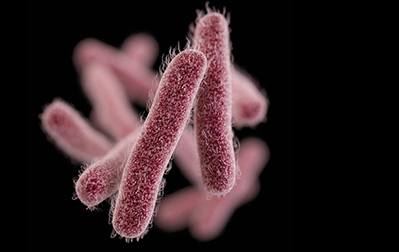Lab confirms Shigellosis in 84 cases out of 150
June 19, 2015
Last updated July 1, 2015
 The State Hygienic Laboratory is working with the Iowa Department of Public Health and Linn County Public Health to determine the source of a large Shigellosis cluster in Linn County. Shigellosis is a gastrointestinal disease that is caused by Shigella bacteria and can be spread either person to person or by food. The role of the laboratory is to perform identification, analysis and surveillance of the cases in Iowa. As of June 19, 150 cases of Shigella were identified in Linn County. The Hygienic Laboratory has confirmed 84 cases since the outbreak began in May.
The State Hygienic Laboratory is working with the Iowa Department of Public Health and Linn County Public Health to determine the source of a large Shigellosis cluster in Linn County. Shigellosis is a gastrointestinal disease that is caused by Shigella bacteria and can be spread either person to person or by food. The role of the laboratory is to perform identification, analysis and surveillance of the cases in Iowa. As of June 19, 150 cases of Shigella were identified in Linn County. The Hygienic Laboratory has confirmed 84 cases since the outbreak began in May.
One of the most important roles of the laboratory is to assist epidemiologists in tracking the source of the outbreak by determining the molecular fingerprint of the bacterial strains. This fingerprint can distinguish cases that are truly part of the cluster to look for shared exposures. For example, they could be traced to a similar food product consumed by all the cases.
Molecular subtyping using pulsed-field gel electrophoresis (PFGE) is performed and subtyping information is uploaded to the national molecular subtyping network known as PulseNet for foodborne disease surveillance. The Hygienic Laboratory is the designated PulseNet laboratory for the state of Iowa. The Linn County outbreak is made up of two unique PFGE clusters grouped into the larger national outbreak code.
Another critical role the Hygienic Lab plays is that it cultures the stools of patients after symptoms have resolved to make sure they no longer carry the bacteria that caused the disease and are no longer a risk to spread to others.
According to the CDC, Shigella symptoms typically start one to two days after exposure, and include diarrhea (sometimes bloody), fever, abdominal pain, and tenesmus (a painful sensation by trying to pass stools even when bowels are empty). Shigellosis can be serious for the very young and the elderly and also for those who are immune-compromised. Shigelloses is self-limiting, which means it typically resolves itself without direct treatment. In rare cases, complications can occur.
Patients suspected of having Shigellosis should contact their health care provider for more information.



